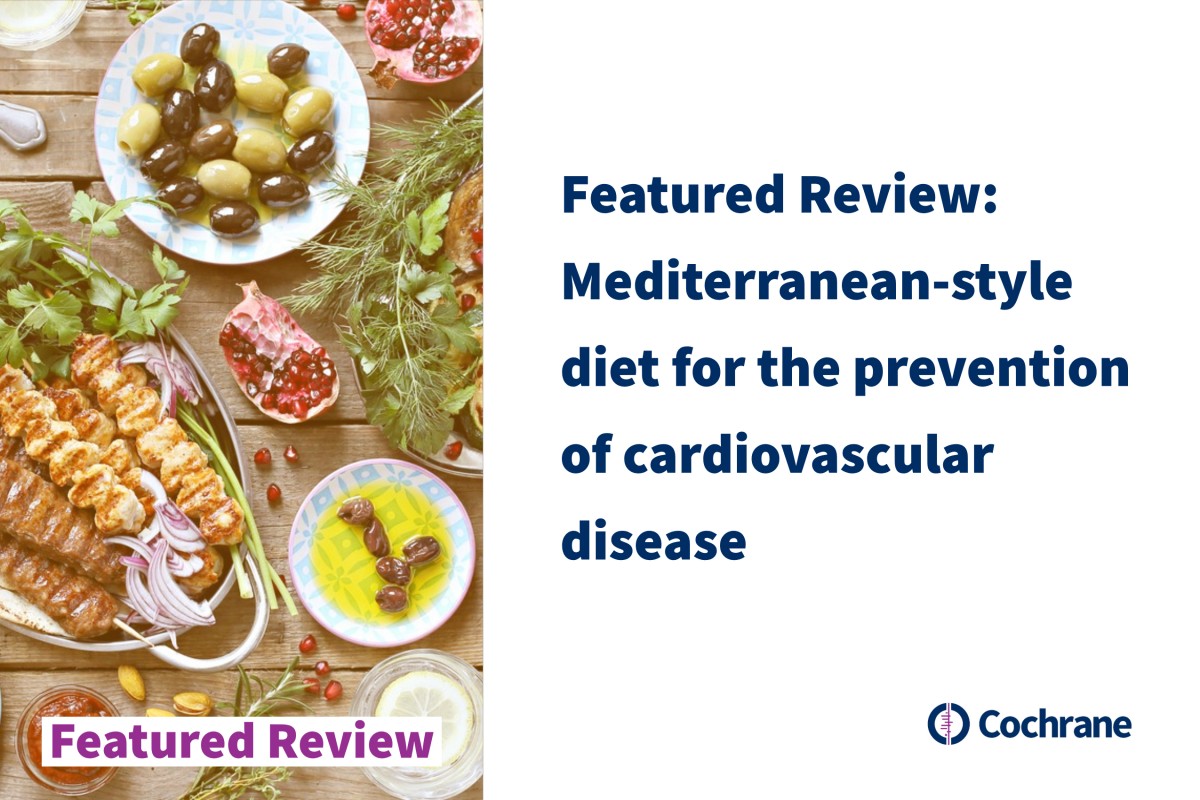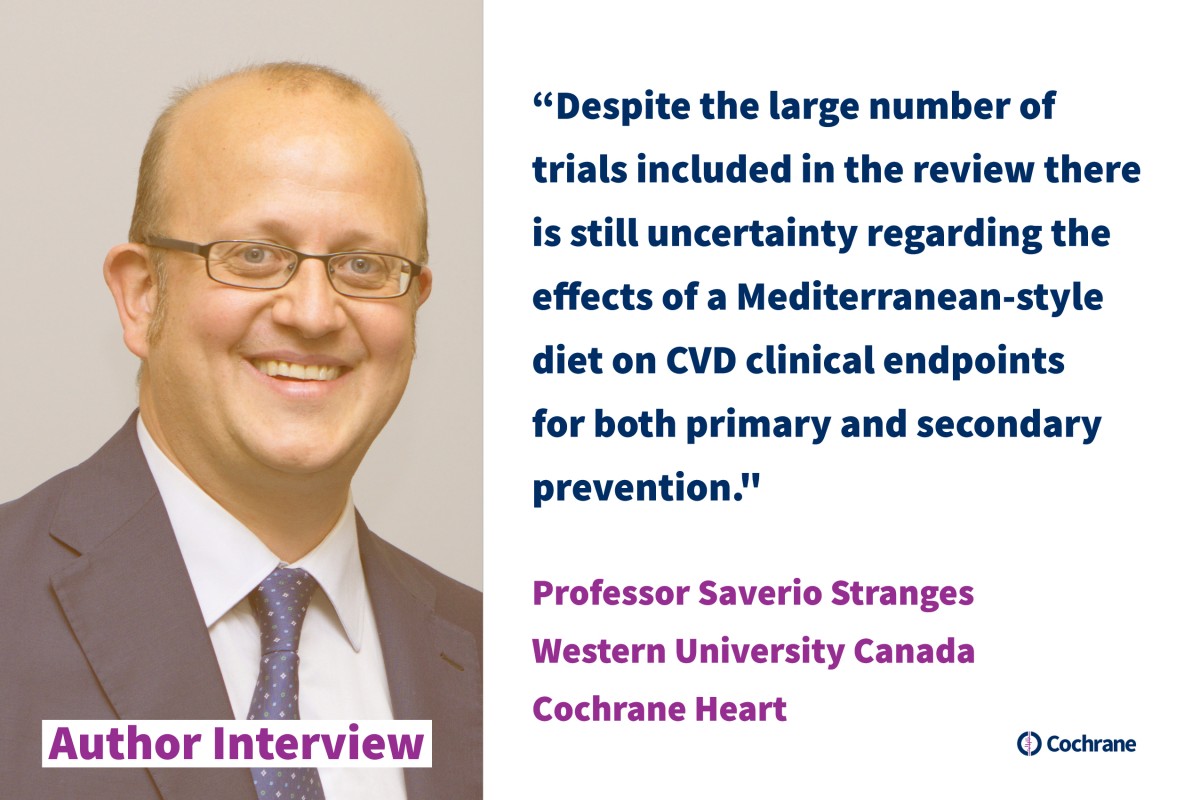Image

In this Q&A we asked the lead author Professor Saverio Stranges from Western University Canada to explain more about the mediterranean diet and its role in preventing cardiovascular disease following the publication of a Cochrane Review on this topic.
What makes a diet ‘Mediterranean’?
Scientific interest in the traditional Mediterranean dietary pattern originated in the 1960s because of the observation that populations in countries of the Mediterranean region, such as Greece and Italy, had lower mortality from cardiovascular disease compared with northern European populations or the US, probably as a result of different eating habits. Key components of a Mediterranean dietary pattern are a high monounsaturated/saturated fat ratio (use of olive oil as main cooking ingredient and/or consumption of other traditional foods high in monounsaturated fats such as tree nuts) and a high intake of plant based foods, including fruits, vegetables, and legumes.
How might consuming these kinds of foods help to reduce the risk of heart disease and stroke?
There is ample observational and experimental evidence supporting potential mechanisms to explain the beneficial effect of the Mediterranean diet on cardiovascular health. For example, there is evidence of favourable effects of the Mediterranean diet on insulin resistance and endothelium-dependent vasoreactivity, as well as of the antioxidant and anti-inflammatory effects of the Mediterranean diet and its individual components such as fruits and vegetables, olive oil, nuts, whole grains, fish and red wine. Overall, the protective effects of the Mediterranean Diet on health outcomes are likely derived from synergistic interactions among different components as a whole dietary pattern rather than from relative effects of specific food groups.
Image

The Cochrane Review looks at primary and secondary prevention. What’s the difference between the two types of population you studied in the review?
Primary prevention refers to adults without established cardiovascular disease (CVD), such as previous myocardial infarction, stroke, revascularisation procedure, angina, cerebrovascular disease (stroke) and peripheral arterial disease. Secondary prevention refers to individuals with established CVD. We wanted to examine the potential effect of a Mediterranean dietary pattern in both populations, to assess the impact of this intervention at different stages of the natural history of CVD.
Image

What are the main findings based on the outcomes of most importance in the Cochrane Review?
Despite the large number of trials included in the review there is still uncertainty regarding the effects of a Mediterranean-style diet on CVD clinical endpoints for both primary and secondary prevention. Overall, the available trial evidence is promising (though not conclusive) and generally supportive of favourable effects of the Mediterranean-style diet on individual cardio-metabolic risk factors (i.e., total cholesterol, systolic and diastolic blood pressure and type 2 diabetes) in primary prevention studies, and potentially cardiovascular morbidity (stroke) and mortality.
One of the trials that was included in the review has been subject to some criticism following its retraction and subsequent republication. It’s a particularly influential trial (PREDIMED) and it’s been blogged about by Hilda Bastian recently.
What happened with this trial and do you think we can still trust its findings?
What happened with this trial and do you think we can still trust its findings?
The original trial (Estruch 2013) was retracted and re-analysed when methodological issues concerning randomisation came to light for 2 sites, and the inclusion of non-randomised second household members. The new publication (Estruch 2018) controlled for these in the analyses and conducted a series of sensitivity analyses excluding these sites. The re-analysed paper also reports clinical endpoints separately where there was low quality evidence of little or no effect of the PREDIMED intervention compared to a low fat diet on total mortality, CVD mortality, or MI, but moderate quality evidence of a reduction in the number of strokes was seen with the intervention.
Overall, we should treat findings from this trial with extreme caution, given the number of methodological issues flagged, as also clearly outlined by Hilda Bastian’s piece.
There are other studies in the review that you had concerns over. Does this reflect problems in running studies or could misconduct be the problem here?
Both issues are possible indeed. Concerns have been publicly raised about potential scientific misconduct and data fabrication, as well as about the integrity and reliability of the published data for a few secondary preventions trials (Singh 1992; Singh 2002).
The review includes a large number of studies yet provides only low or very low certainty evidence. Can you explain why this is?
Overall, there were limited data on clinical endpoints, our primary outcome. Two studies were excluded from all main analyses in sensitivity analyses due to published concerns regarding the reliability of the data (Singh 1992; Singh 2002). Only one trial reported clinical endpoints for primary prevention and this study experienced methodological issues regarding randomisation with the report subsequently being retracted and re-analysed (PREDIMED).
The findings in secondary prevention are based on one older trial reporting very large effect estimates (The Lyon Diet Heart Study) using a modified Zelan design. In addition, both the PREDIMED trial and The Lyon Diet Heart Study supplied supplemental foods as well as dietary advice to follow a Mediterranean-style diet so the policy implications of the findings of these trials are unclear (Appel 2013). The majority of studies included in this review were at unclear risk of bias for many of the risk of bias domains so results should be interpreted cautiously. High risk of bias was noted for differential attrition rates between the intervention and control groups in two trials (Djuric 2009; Vincent-Baudry 2005), and high risk of other bias in two trials where there are published concerns regarding the reliability of the data (Singh 1992; Singh 2002). These two studies have been excluded from the main analyses.
What sort of studies do we need now to address the uncertainties that the review has identified?
Several ongoing trials have been identified, particularly reporting clinical endpoints in secondary prevention, which will add to the evidence base. Further adequately powered primary prevention trials are needed to confirm findings on clinical endpoints to date. With the accrual of further evidence, the heterogeneity observed between trials in terms of both the nature and duration of the intervention, comparators, and the range of participants recruited can be explored further and its impact on outcomes examined. The ongoing studies may help reduce the uncertainty.

